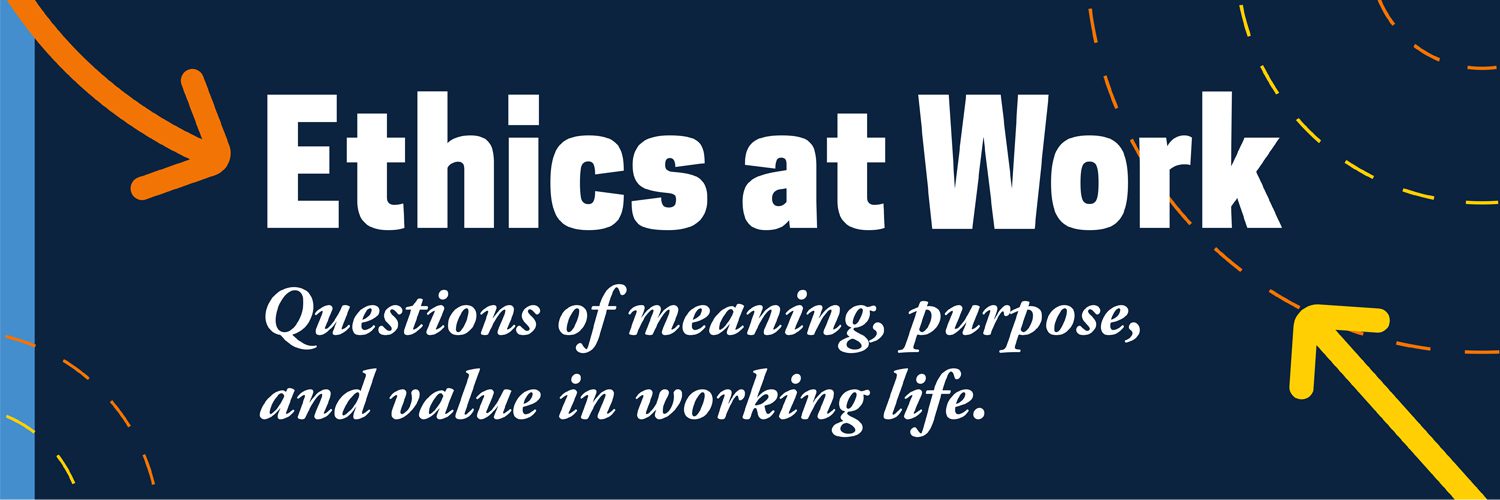Economy, Community, and Moral Theology

Today the Ethics at Work Crew chats with Fr. Gilbrian Stoy, C.S.C. '13, '19 MDiv. Fr. Gil has a variety of interests: economy, technology, ecology, and communion theology. Interestingly, Fr. Gil tells us that communion and community should be at the forefront of the way we think about economy.
In today’s episode, we set the scene for understanding community through the lens of The Road by Cormac McCarthy to begin to unpack how economy involves relationships and meaning. This book gives us an image of communion, which structures everything about the Christian faith. Fr. Gil views the economy as a means for relationships. He pushes us to see each other at the ends of economic exchange and invites us to remember our relationships and human dignity in these exchanges. Looking at the messy human relationships across economic communities, Fr. Gil highlights how technology obscures the relationships that drive the economy. He reminds us that the common good can only be achieved in the collective, so setting up communities of virtue require relationships and common deliberation. Justice starts with an internal disposition of charity toward the other met by systems that enable the common deliberation. Just technologies encourage us to see each other more clearly and to act with charity towards each other.
We invite you to consider with us the social concerns at the heart of economic exchange and to consider the people inside and across our economic endeavors.
Listen to the Episode
Wednesday, October 11, 2023 8:00 am
Today the Ethics at Work Crew chats with Fr. Gilbrian Stoy, C.S.C.’13, ’19 MDiv. Fr. Gil has a variety of interests: economy, technology, ecology, and communion theology. Interestingly, Fr. Gil tells us that communion and community should be at the forefront of the way we think about economy.
In today’s episode, we set the scene for understanding community through the lens of The Road by Cormac McCarthy to begin to unpack how economy involves relationships and meaning. This book gives us an image of communion, which structures everything about the Christian faith. Fr. Gil views the economy as a means for relationships. He pushes us to see each other at the ends of economic exchange and invites us to remember our relationships and human dignity in these exchanges. Looking at the messy human relationships across economic communities, Fr. Gil highlights how technology obscures the relationships that drive the economy. He reminds us that the common good can only be achieved in the collective, so setting up communities of virtue require relationships and common deliberation. Justice starts with an internal disposition of charity toward the other met by systems that enable the common deliberation. Just technologies encourage us to see each other more clearly and to act with charity towards each other.
Fr. Gilbrian Stoy, C.S.C., is Holy Cross Priest and doctoral student in Moral Theology in the School of Theology and Religious Studies at The Catholic University of America. His research interests focus on the intersection of economics, ecology, and ethics. He has received both a B.S. and MDiv from the University of Notre Dame, as well as an MST in Christian Ethics from the University of Oxford.
We invite you to consider with us the social concerns at the heart of economic exchange and to consider the people inside and across our economic endeavors.
The Ethics at Work Podcast is edited and produced by Nat Todaro and Megan Levis.
View EventMeet the Speaker: Fr. Gilbrian Stoy, C.S.C. '13, '19MDiv

Fr. Gilbrian Stoy, C.S.C. ’13, ’19MDiv is Holy Cross Priest and doctoral student in Moral Theology in the School of Theology and Religious Studies at The Catholic University of America. His research interests focus on the intersection of economics, ecology, and ethics. He has received both a B.S. and MDiv from the University of Notre Dame, as well as an MST in Christian Ethics from the University of Oxford. He serves as an assistant rector in Alumni Hall. Originally from Little Falls, Minnesota, he joined the Congregation of Holy Cross in 2013 after graduating from the University of Notre Dame with a BS in Pre-professional studies.
Work and Ultimate Meaning
In this video, Prof. Paul Blaschko (Philosophy, University of Notre Dame) talks about whether our work should be a source of “ultimate” meaning in our lives.
The Road by Cormac McCarthy

From the Publisher: WINNER OF THE PULITZER PRIZE • NATIONAL BESTSELLER • A searing, post-apocalyptic novel about a father and son’s fight to survive, this ”tale of survival and the miracle of goodness only adds to McCarthy’s stature as a living master. It’s gripping, frightening and, ultimately, beautiful” (San Francisco Chronicle).
A father and his son walk alone through burned America. Nothing moves in the ravaged landscape save the ash on the wind. It is cold enough to crack stones, and when the snow falls it is gray. The sky is dark. Their destination is the coast, although they don’t know what, if anything, awaits them there. They have nothing; just a pistol to defend themselves against the lawless bands that stalk the road, the clothes they are wearing, a cart of scavenged food—and each other.
The Road is the profoundly moving story of a journey. It boldly imagines a future in which no hope remains, but in which the father and his son, “each the other’s world entire,” are sustained by love. Awesome in the totality of its vision, it is an unflinching meditation on the worst and the best that we are capable of: ultimate destructiveness, desperate tenacity, and the tenderness that keeps two people alive in the face of total devastation.
